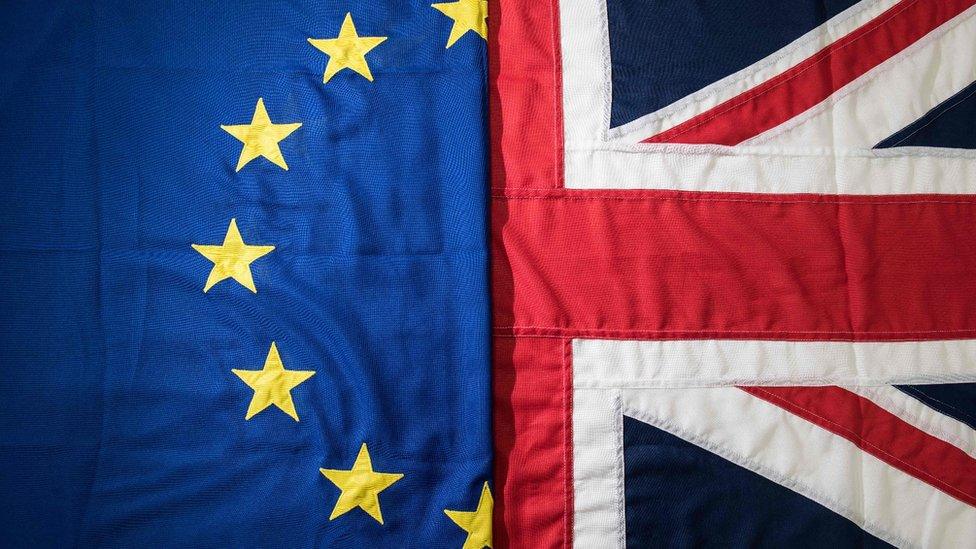Brexit: UK-EU trade deal announced after long talks
- Published
- comments
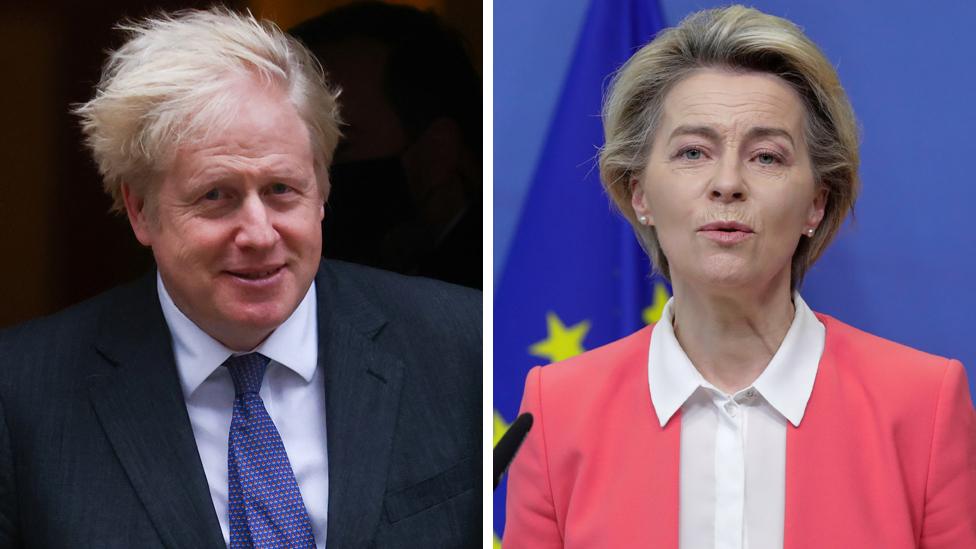
Boris Johnson and European Commission President Ursula von der Leyen
Prime Minister Boris Johnson has announced that the UK has reached an agreement with the EU over post-Brexit trade and security.
He has spent a lot of time with officials in Brussels finalising the details of a deal that will come into force when the UK leaves EU trading rules on 31 December.
They have agreed that there will be no charges on each other's goods when they cross borders (known as tariffs) and no limits on the amount of things which can be traded (known as quotas).
The UK government says the deal covers trade worth £668bn in 2019.
Prime Minister Boris Johnson said it is the "biggest deal yet" and means the UK has "taken back control".
European Commission president Ursula Von der Leyen said competition rules - designed to prevent one side gaining an unfair advantage - "will be fair and remain so".
The two sides will now have to get the deal formally approved in London and Brussels.
So how did we get to this point and what does this deal actually mean?
What is Brexit?
Brexit: The story so far
On 23 June 2016, UK adults voted for the UK to leave a group of countries called the European Union (EU).
It's most commonly referred to as Brexit, a word made up of the words 'Britain' and 'exit'.
The UK was first due to leave the EU at 11pm on Friday 29 March 2019, but this didn't happen.
It was rescheduled for the 31 October 2019, and then extended with UK and EU politicians trying to make the final arrangements for Brexit to happen.
In the end the UK officially left the EU on 31 January 2020 but since then there has been an 11 month transition period.
During the transition period the UK stayed under EU trading rules to give leaders time to work out between them what the relationship between the UK and the EU will be.
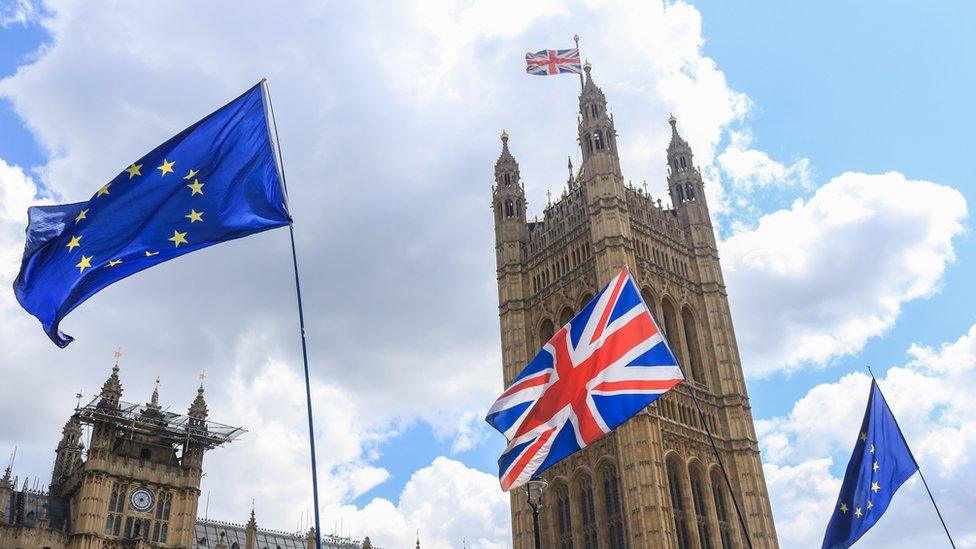
23 June 2016 - The UK votes to leave the EU
17 October 2019 - The European Union and Britain announce their agreement on a new draft Brexit agreement.
19 October 2019 - MPs vote to delay a decision on the draft deal, arguing they need more time to study its contents before the October 31 deadline.
31 October 2019 - The second Brexit deadline passes without a deal being done
23 January 2020 - The UK's EU Withdrawal bill becomes law
1 February - Transition phase begins, running to 31 December 2020.
What is the deal?
It's more than 2000 pages long, and lists how the EU and the UK will trade (buy and sell things to each other) in the future. It will start on 1 January 2021.
While the UK was in the EU, companies could buy and sell goods across EU borders without paying tariffs.
This trade agreement means that tariff free trading can continue which is good news for businesses who would have had to pay extra taxes if there had not been a deal, which would have added to their costs.
Brexit supporters say leaving the EU will give the UK more freedom to strike trade deals around the world.
Opponents say it is better to remain close to the EU because it is such an important trading partner.
We will find out more about the detail over the coming days and weeks.
So does that mean that nothing will change?
No, even with a deal from the 1 January 2021, the way people live and work in the UK will be different.
People planning to travel between the UK and EU to live, study, or even on holiday will face different rules.
And, it goes both ways, as those wanting to move to the UK from the EU will face a points-based immigration system, looking at things such as skills and education before they can live in Britain.
There will also be new blue passports and rules around taking your pets abroad.
Tourists heading to EU countries will need a passport that is less than 10 years old and has at least six months left until it runs out.
What does it means for EU citizens in the UK, and UK citizens in the EU?
In January 2020 these British kids who live in Brussels told Newsround what they thought about Brexit
The UK and the EU will still work together on things like climate change, energy, security and transport.
However, even with a deal, there will be some new border checks - so businesses will need to be ready for changes.
People planning to move between the UK and EU to live, work, or retire will no longer be automatically allowed to do so
The UK will apply a points-based immigration system to EU citizens
Travel rules are changing, so people will need to check their passport is still valid, that they have health insurance and the right driving documents
The UK will no longer make such big annual payments towards the EU's budget
Arrivals from the UK will stand in a different queue at passport control in EU countries
There's a lot of detail to go through and it may take some time to fully understand what the deal means for everyday life, including going on holiday or studying in the EU in future.
Why has fishing been such a big deal?
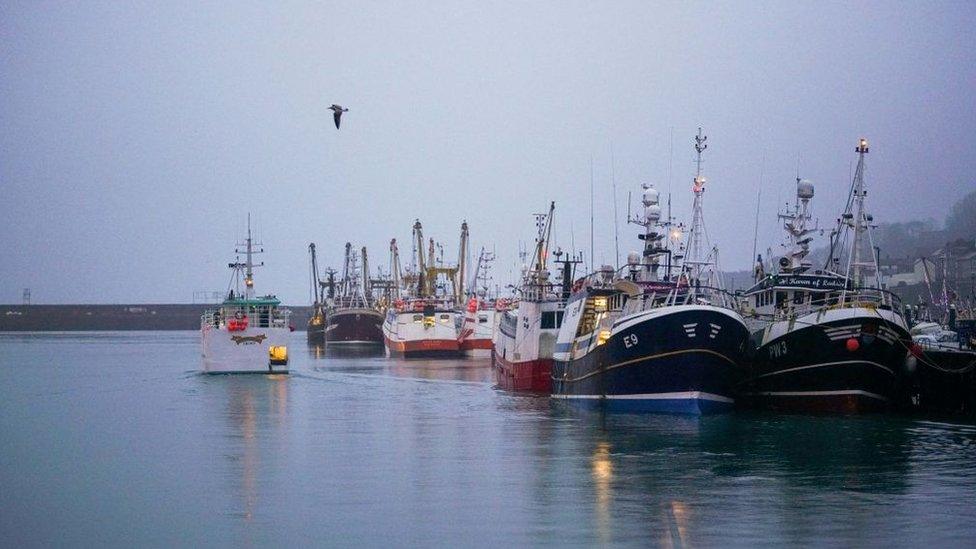
For many people who supported Brexit, having control over who could fish in the parts of the sea controlled by the UK was very important.
It is important to the EU as well, so both sides needed to be happy with the agreement.
It is believed one of the reasons the negotiations took so long was because the two sides couldn't agree on the quotas for particular types of fish.
BBC Europe reporter Gavin Lee said that this was the main reason that talks went on through the night, with leaders negotiating species by species - herring by herring, mackerel by mackerel - and delayed the deal being announced.
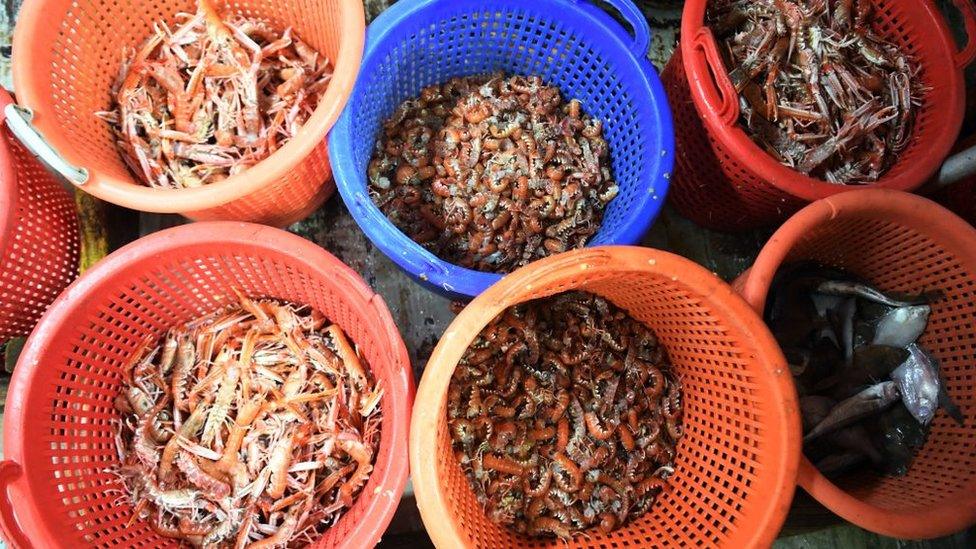
What about Northern Ireland?
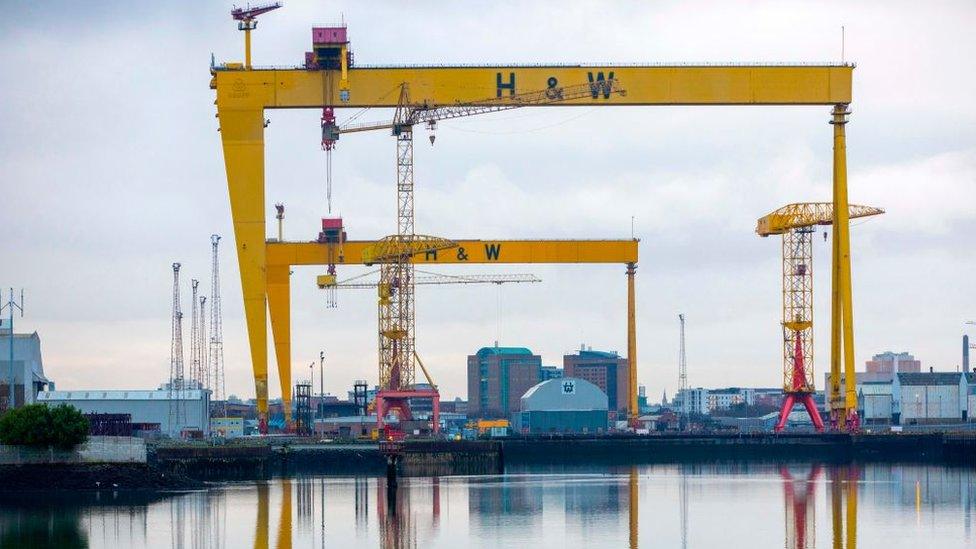
What happens to the border between Northern Ireland and Ireland after Brexit has been one of the main talking points ever since Brexit was announced.
When the Brexit transition ends on 1 January 2021 there will be a new trade border between Northern Ireland and the rest of the UK.
While the rest of the UK will leave the EU single market for goods, Northern Ireland will stay in and continue to enforce EU customs rules at its ports.
This means the British government will impose customs checks between Northern Ireland and Britain, while the border between Northern Ireland and the Republic of Ireland will remain open.
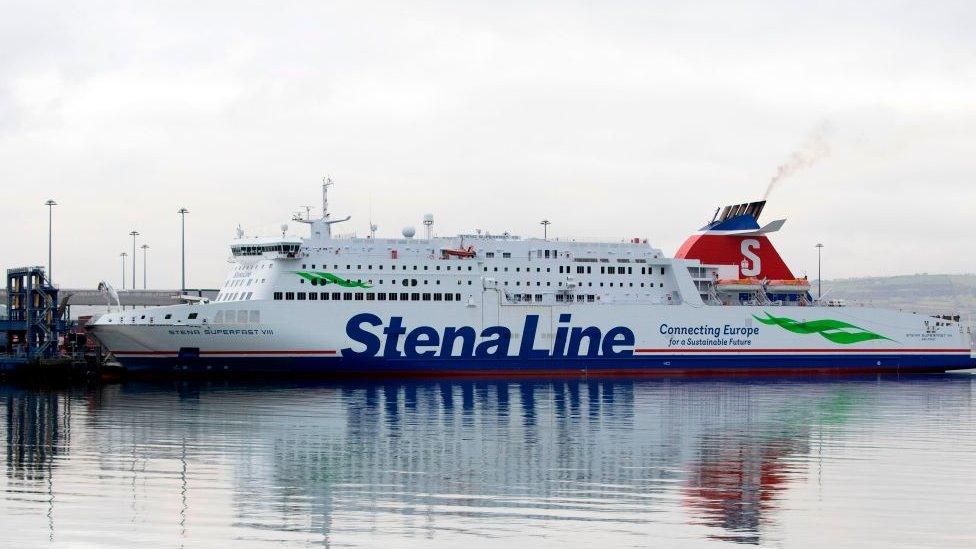
Belfast Harbour is Northern Ireland's main maritime gateway, and is expected to be having a new Border Control Post built there due to Brexit
It means food products arriving in Northern Ireland from Great Britain will be subject to EU processes.
This will prevent a hardening of the land border with the Republic of Ireland while creating a new "sea border" with the rest of the UK.
From 1 January all commercial goods coming from GB to NI will need a customs declaration. Food products will also undergo additional checks and controls.
Does this mean I'll never hear about Brexit again?
Many people will hope so! The years following the referendum have been marked by bitter argument, and now there is a deal Boris Johnson hopes some of that angry debate will go away.
But people in the UK are still very divided about whether Brexit was a good idea, and much will depend on what happens next, and whether this deal is seen to be a success or not.
- Published31 January 2020
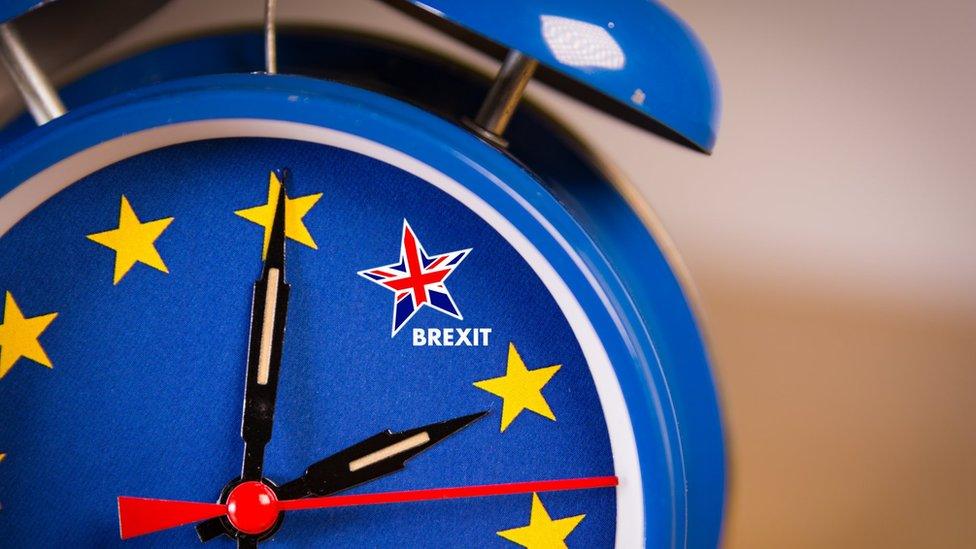
- Published16 September 2019
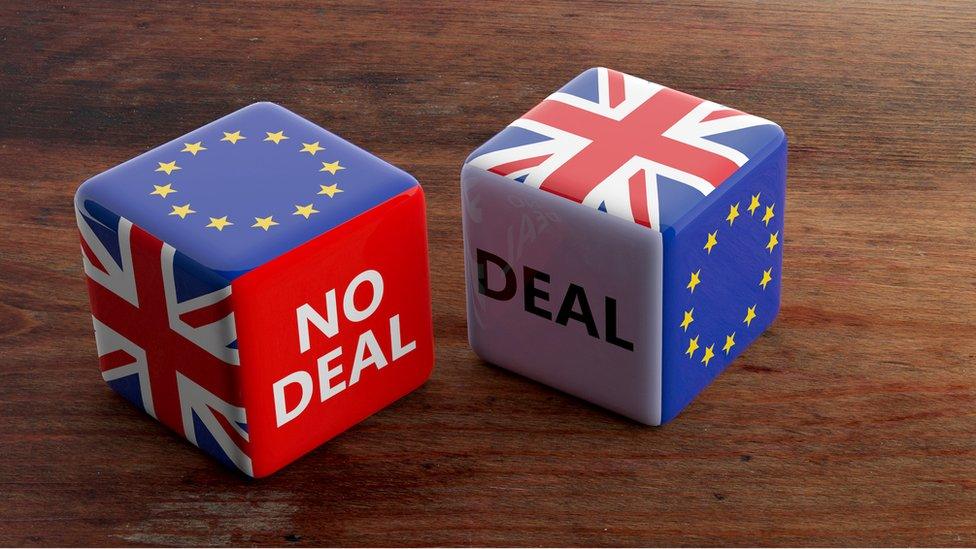
- Published18 December 2020
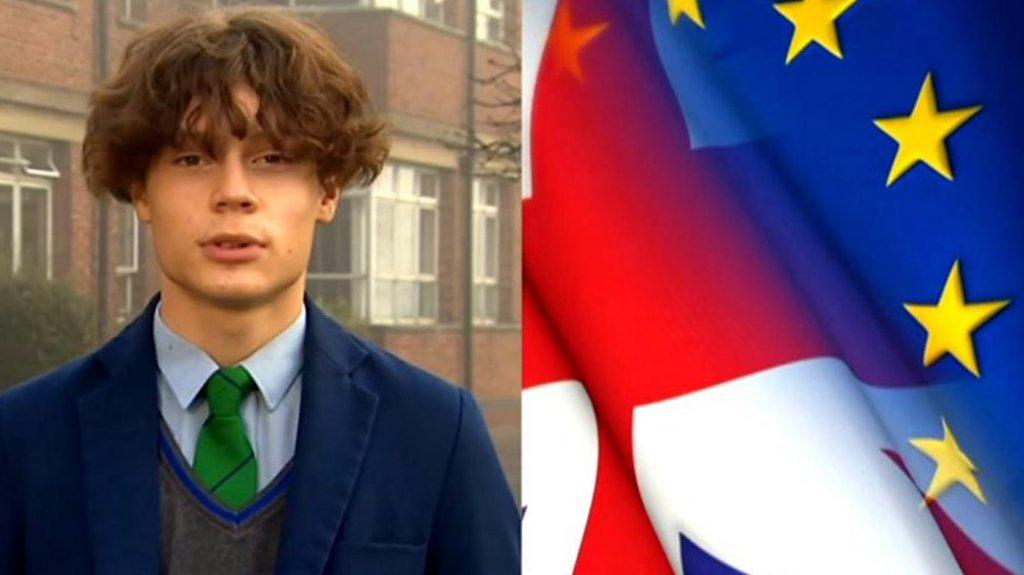
- Published17 September 2018
